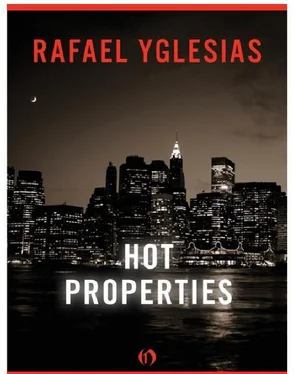“Listen, you sound lonely. Don’t you want to come and stay with me?”
“I don’t want to miss Paula’s call,” Patty answered.
“Oh, right! I better hang up.”
For an hour she waited, expecting it to ring. When it did, it was Betty. “Did she call?”
“No.”
“I called to warn she might not for a few days. She asked me to messenger a copy of your novel over tomorrow. She might intend to read it first.”
“Oh,” was all Patty said. But it changed everything. No one had yet read her book and flipped over it. If Paula Kramer was looking for a counterargument to Fred. Patty’s slim sardonic observations of the conflicts arising in a young woman raised to be Doris Day in a world that wanted Superwoman wouldn’t have sufficient clarity or stridency. Her story didn’t come to a definite conclusion like Fred’s — she simply wanted the reader to ride her heroine’s roller coaster and, at the end, know only what she knew: there were other rides, but that was the only one she had a ticket for. Maybe her book was boring. At least, unlike Fred’s, it had the virtue of truth.
“So you can stay over,” Betty said. “You sound terrible.”
“I’m just tired,” Patty answered, telling the truth. She was tired of being helped. Tired of all the little lies everybody told each other. Tired of this stupid city, with its expensive slums and overpaid egotists. “I’ll be fine here,” she said.
Tony reached out of the car window and pressed the button. He glanced at the fifteen-foot-high gate, half-expecting it to open automatically. A voice squawked at him, sounding like a parody of a Japanese houseboy: “Yes? Who is?”
“It’s Tony. Tony Winters.”
“Please close behind you.”
There was a buzz and the gate unlocked, the doors separating a few inches. He got out to open them wider, drove in. and then got out again to close them. The wide sweeping driveway curved around to an entrance with white columns that supported a structural awning. He glanced up at the place. It looked huge: the plantation home of a wealthy Southern family. “Here I am at Mom’s,” he said to himself.
The Japanese who had buzzed him in opened the door as he approached. “Did you lock gate?”
“Yes.”
“Tony!” his mother called from inside the house. He wandered toward the voice, entering a large living room crowded with couches. There were four of them forming a square in the center of the room, leaving only a foot or so between them to squeeze through. The rest of the room seemed to be taken up by end tables, except for one forlorn low Victorian chair in a corner.
“Is your security gate supposed to work that way?” Tony asked, approaching the couches. He then noticed, buried in one of them, a smallish woman with a sharp chin, a long thin nose, and small clever eyes accented by arching sarcastic eyebrows, smoking a long thin cigar.
“It’s there to encourage burglars and discourage guests,” the stranger said.
Maureen laughed. “You’re too clever,” she answered the woman. “It’s broken, darling,” she said to Tony, draping an arm over the back of the couch, reaching for his hand. He took it and she pulled him toward her. He almost flipped over the couch. She kissed him (her breath smelled of wine; there was an open bottle on the glass coffee table) on the lips. “You look marvelous.”
“Malibu tan,” said the small lady, putting her cigar gently onto an ashtray.
“This is my dear friend Andrea Warren.” Maureen squeezed Tony’s face. “My beautiful brilliant boy.”
“Hello,” Andrea said in a deep voice. Everything she said seemed sly and sarcastic.
“Hi,” Tony said. He hated all his mother’s friends on sight. Experience had taught him they were invariably flatterers.
“Do you remember Andrea?” Maureen asked.
“Of course he doesn’t,” she said. He looked at her closely. Her pageboy haircut and smooth skin had fooled him: though at first glance she looked ten years younger, the graying streaks and crow’s-feet betrayed that she was his mother’s age. “He was a baby.”
“We lived through the dark ages together out here before you were born and—”
“He couldn’t have been more than two or three,” Andrea said to Maureen.
“My dear, that whole decade is a fog to me.” She drank from her glass. “Everything is a fog. When I glance at the news and see Ronald Reagan, part of me thinks: ‘Is he still working?’ ”
“No!” Andrea snapped. “He’s just renting the White House to take naps.”
“I bet it is a good place to nap,” Maureen said. She patted the couch. “Jump in.”
Tony smiled. “I practically have to.”
“Kyoto!” Maureen yelled. “Bring a glass for my son!”
They sat while the sun went down, drinking and talking. Tony felt drunk after only a few glasses, but soon that passed, and it seemed no amount of alcohol could influence the languid sense that time was passing very slowly, if at all, in the mountainous couches. Food was never mentioned, although he had been invited to dinner. With the second bottle of wine, cheese and crackers appeared, but only Tony partook. Maureen and Andrea seemed content to merely drink and smoke. They had him talk about living and working with Garth — he made the obvious jokes about a star’s egomania. “Oh, we actors are terrible!” his mother would comment periodically, more, Tony thought, to imply that she wasn’t that way than to acknowledge that she was. Andrea, he found out, had been the wife of a blacklisted writer who died in the sixties from a heart attack (“from a condition Joe McCarthy gave him,” Maureen said; “from booze and red meat,” Andrea answered), and had turned to producing herself. “She’s a great success,” Maureen commented. “She did The Last Dinosaurs.” Namely a TV movie about nuclear war ending all human life. “We sit and talk,” Maureen went on. “Talk and sit. About the old days. Right?”
Andrea raised her glass, her mouth twisted in a smile of celebration and a frown of regret.
“Before we knew the world was full of bastards,” Maureen concluded. There was a heavy pause. The moment of silence for all the wounded of the blacklist. Tony had long ago named it for himself. She looked at him coldly. “Like your father,” she said.
“Maureen,” Andrea said sadly, the way one might react to a hopelessly spoiled child: scolding having given way to a perfunctory acknowledgment.
“Don’t count on him to help you out.” Maureen went on. “If you agreed to go back to work on this script because you assume Daddy, being the big cheese at International, will give it a go, you’re sadly mistaken.”
“I don’t count on him,” Tony said, looking away from her: everything else seemed to blur, however, until he returned to focus on her face. I’m very drunk, he realized.
“Bullshit, you don’t. You should have stuck to writing plays. Not let them get their filthy hands on your art.”
“Now, now,” Andrea interrupted. “The only people who haven’t sold out are the ones who haven’t been asked.”
“That’s not true! You didn’t sell out,” Maureen said.
“I had nothing to sell out,” Andrea answered.
“What about you, Mom?” Tony said, unable to restrain his anger. “What the hell are you doing in I Love Lucy II?”
“That’s not selling out, honey,” Maureen answered, saying “honey” as though it was an obscene word. “That’s staying employed.”
“Well, that goes for me too, Mom. I haven’t turned down Broadway — they turned me down.”
“You didn’t try very hard,” she answered, looking lofty, though her consonants had become soft from drink. “You quit after three plays at the age of thirty.”
Читать дальше












